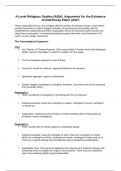A-Level Religious Studies (AQA): Arguments for the Existence
of God Essay Plans (A/A*)
These essay plans form a core of highly effective revision for practice essays, mock exams
and the real exams in AQA’s Religious Studies. Ensure that you are familiar with the
comprehensive arguments and these essay plans will be an extremely useful revision tool.
Using these essay plans, I consistently produced essays that were scored between 8-10
marks, an A/A* grade. Good luck!
The Cosmological Argument:
Intro:
Key Thinker- St Thomas Aquinas, 13th century Italian Christian monk and theologian.
Writes ‘Summa Theologica’ in which he outlines his ‘five ways’.
The Cosmological Argument is one of these.
Cosmos is Greek for universe, argument based on the universe.
Aposterori argument, based in observation.
Golden Nugget: everything is contingent, therefore, God must exist as the uncaused
first necessary being.
Paragraph 1:
Point: everything is contingent on something else for its existence.
Evidence/example: books are contingent on paper, contingent on trees, contingent
on seeds etc.
Explanation: nothing can exist of itself, it needs something else to bring about its
existence. Hence contingency.
Paragraph 2:
Point: cannot have an infinite regress of contingent beings.
Evidence/example: using the examples of trees- these are contingent on seeds
which are contingent on trees, contingent on seeds, contingent on trees and so on.
There is no logical starting point through this and no satisfactory explanations.
Explanation: thus, this cannot be applied to the universe as it would not answer why
everything exists or explain the origins of the universe. There must be a definitive
start, thus rendering infinite regress impossible.
, *Paragraph 3:
Point: there must be a necessary being (i.e. a being which ‘contains within itself the
reason for its own existence’ - Coppleston, not contingent on anything else).
Evidence/example: when dominoes are set up and pushed down, they need
someone to set them up and push them over in order for this to occur, thus in this
instance the person is the necessary being.
Explanation: thus, for the universe to exist, there must be a necessary being which is
contingent on itself and upon which everything else is contingent and thus relies on
to exist.
*Paragraph 4:
Point: Aquinas concludes that this necessary being is God.
Evidence/example: in the Bible God says ‘I am the alpha and the omega…’
(Revelation 22:13), the beginning and end of all things. God is eternal and so, he
himself has no beginning or end.
Explanation: God is the uncaused first necessary being, as he is the beginning and
end of all things and is himself eternal, it is clear he causes his own existence and
that everything in the universe is contingent on him.
*Paragraphs 3 and 4 can often be combined, results are usually better when this is
done
The Teleological (‘Design’) Argument:
Intro:
Key Thinker- William Paley, 18th century, English Christian priest (Archdeacon of
Carlisle, better essays include this in the introduction).
Argument took the form of a series of published sermons.
Commonly referred to as the ‘Design Argument’ but actually called the ‘Teleological
Argument’.
Telos is Greek, meaning end/purpose.
The argument is based in observation, so is aposteriori.




